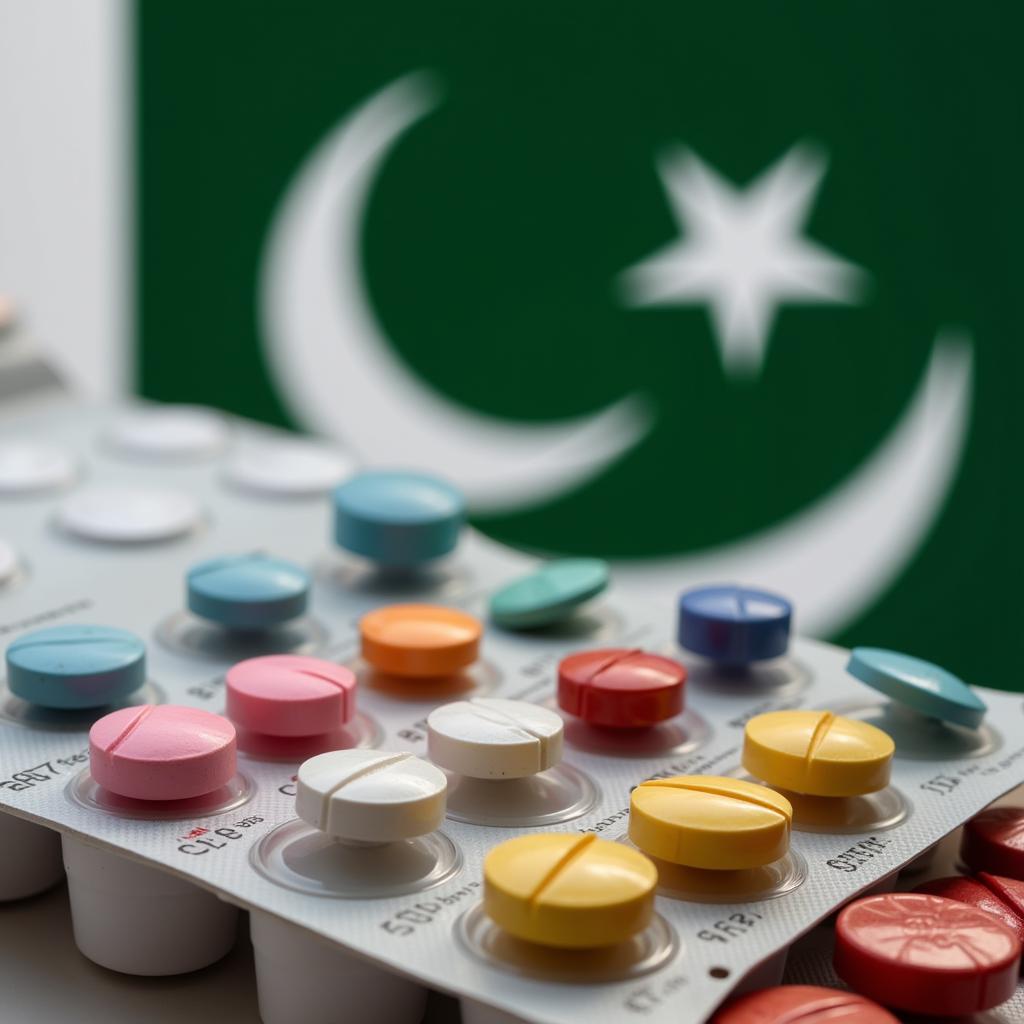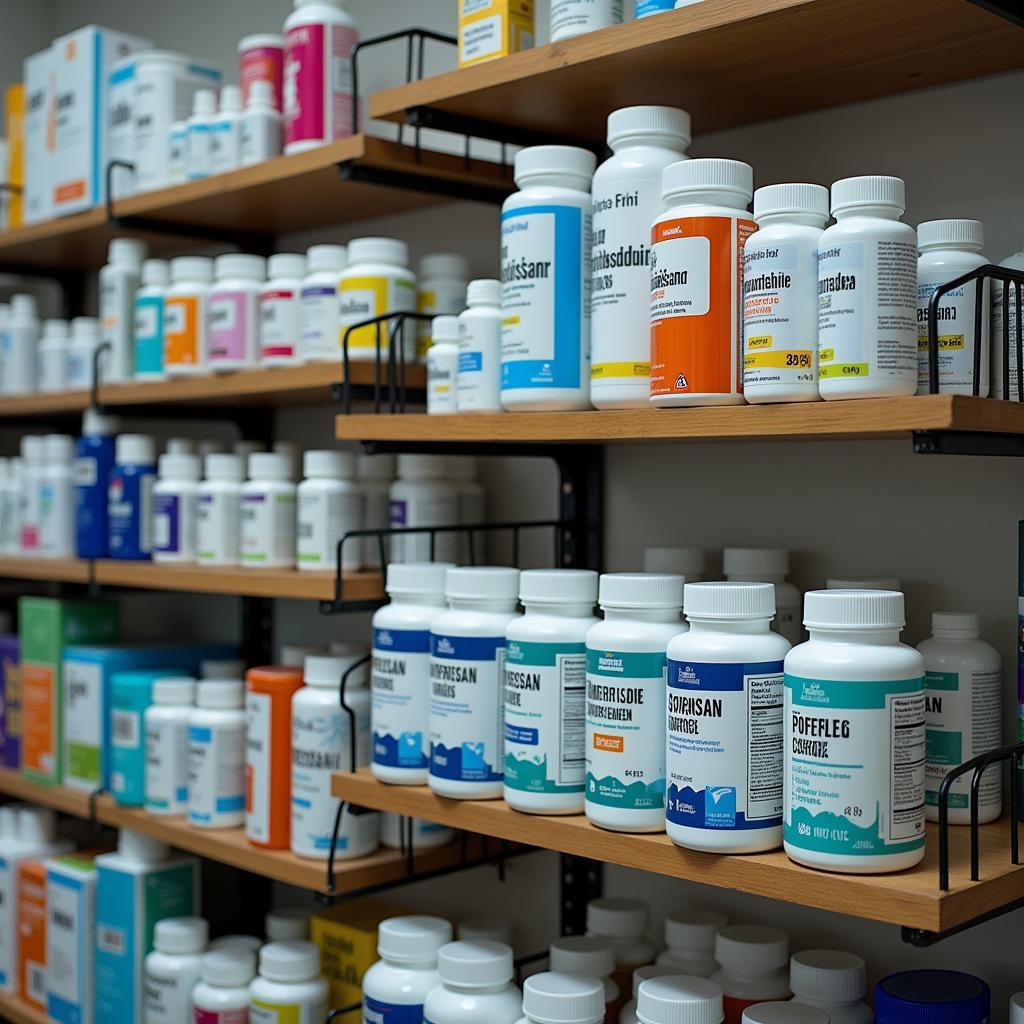Antidepressants Medicine In Pakistan plays a crucial role in addressing the rising concern of mental health issues. As awareness and understanding of mental health grow, so does the demand for effective treatment options. This article delves into the landscape of antidepressants in Pakistan, exploring their availability, types, usage, and the cultural factors influencing their perception.
Understanding Antidepressants and Their Role
 Antidepressant pills in a medicine box with the Pakistani flag in the background
Antidepressant pills in a medicine box with the Pakistani flag in the background
Antidepressants are medications primarily prescribed to manage the symptoms of mental health conditions like depression, anxiety disorders, and some chronic pain conditions. They work by balancing chemicals in the brain, known as neurotransmitters, that affect mood and emotions. It’s crucial to understand that antidepressants are not a “quick fix” but rather a tool to manage symptoms, often used in conjunction with therapy and lifestyle changes.
Common Types of Antidepressants Available in Pakistan
Pakistan’s pharmaceutical landscape offers a range of antidepressants, broadly classified into a few main categories:
- Selective Serotonin Reuptake Inhibitors (SSRIs): Commonly prescribed as the first line of treatment, SSRIs like Escitalopram, Sertraline, and Fluoxetine are generally safe and well-tolerated.
- Serotonin-Norepinephrine Reuptake Inhibitors (SNRIs): These medications, including Venlafaxine and Duloxetine, act on both serotonin and norepinephrine, potentially offering benefits for those with anxiety alongside depression.
- Tricyclic Antidepressants (TCAs): Older antidepressants like Amitriptyline and Imipramine are still used but may have a higher risk of side effects compared to SSRIs and SNRIs.
- Other Antidepressants: Atypical antidepressants like Mirtazapine and Bupropion work differently from other classes, providing alternative options for individuals who haven’t responded well to other medications.
Navigating Access and Affordability
 A pharmacy in Pakistan with a focus on antidepressant availability
A pharmacy in Pakistan with a focus on antidepressant availability
While a variety of antidepressant medications are available in Pakistan, access and affordability can pose significant challenges. Factors like geographical location, socioeconomic status, and availability of mental health professionals can influence an individual’s ability to receive appropriate treatment.
Bridging the Gap: Initiatives and Support Systems
To address these challenges, several initiatives and organizations in Pakistan are working to improve mental health awareness and access to care. These include:
- Government initiatives: The Pakistani government has taken steps to integrate mental health into primary healthcare.
- Non-profit organizations: Organizations like the Pakistan Association for Mental Health (PAMH) provide support, resources, and advocacy for individuals with mental health conditions.
- Online platforms: Telemedicine and online counseling platforms are emerging as viable options for bridging the gap in access, particularly in remote areas.
Addressing Stigma and Cultural Considerations
One of the most significant hurdles in addressing mental health in Pakistan is the prevailing stigma. Cultural beliefs, societal pressures, and a lack of understanding often prevent individuals from seeking help or disclosing their struggles.
It’s essential to recognize that mental illness is not a sign of weakness and that seeking help is a sign of strength. Open dialogues within families, communities, and educational institutions are crucial for dispelling myths and fostering a supportive environment.
Seeking Professional Guidance: The First Step
If you suspect you or someone you know might benefit from antidepressants, it is crucial to consult a qualified psychiatrist or mental health professional. They can provide an accurate diagnosis, recommend appropriate treatment options, and offer guidance tailored to individual needs. Remember that recovery is a journey, and seeking professional help is the first step towards well-being.
FAQs About Antidepressants in Pakistan
1. Are antidepressants addictive?
Antidepressants are generally not considered addictive. However, it is essential to follow your doctor’s instructions for dosage and duration of treatment.
2. How long does it take for antidepressants to work?
It can take several weeks for antidepressants to have their full effect. Be patient and continue taking your medication as prescribed.
3. What are the potential side effects of antidepressants?
Side effects can vary depending on the type of antidepressant. Common side effects might include nausea, headache, or changes in sleep patterns.
4. Can I stop taking antidepressants on my own?
It is crucial not to stop taking antidepressants abruptly, as this can lead to withdrawal symptoms. Consult your doctor for guidance on safely discontinuing your medication.
5. Are antidepressants safe during pregnancy?
If you are pregnant or planning to become pregnant, discuss your medication options with your doctor to ensure the safety of both you and your baby.
6. Where can I find more information about mental health resources in Pakistan?
Organizations like the Pakistan Association for Mental Health (PAMH) offer valuable resources and support.
Need Help? Reach Out Today.
If you’re struggling with your mental health, remember you’re not alone. For support, information, and guidance, please contact our team at:
Phone: +923337849799
Email: [email protected]
Address: Dera Ghazi Khan Rd, Rakhni, Barkhan, Balochistan, Pakistan.
We offer 24/7 support and are dedicated to helping you navigate your mental health journey. You can also find helpful information on our website related to 6 pound boski price in pakistan.